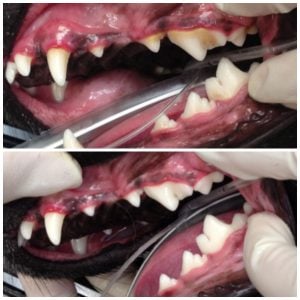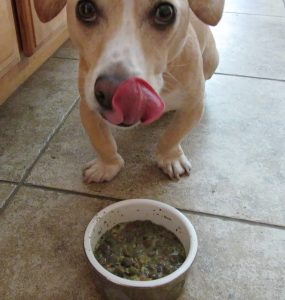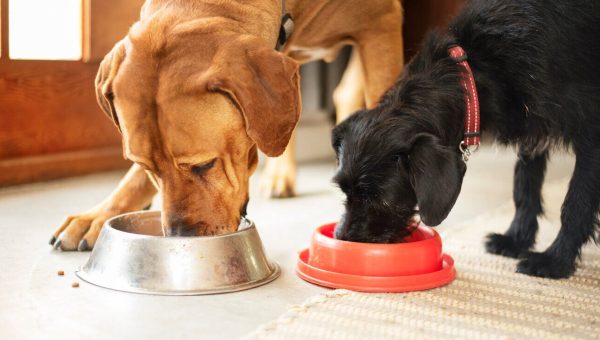- Not a substitute for professional veterinary help.
When it comes to our pets, there’s nothing we won’t do to keep them happy and healthy. But too many pet parents are unaware of some very common—and easily preventable—health issues.
Read on for the most common mistakes dog owners make that prevent their pets from achieving optimal health.
Ignoring Dental Health

Can you tell this dog has stage 1 dental disease? The red line between the gum and the base of the tooth represents gingivitis. Regular brushing and a professional teeth cleaning under anesthesia (before above, after below) will reverse the problem at this stage, but advanced stages are irreversible.
This may be the single most important but overlooked health routine for your dog—caring for his teeth!
Roughly 85% of dogs will develop dental disease in their lifetime, most before they are three years old. Dental disease can be debilitating, even deadly as bacteria in the gums gets into the bloodstream.
Founder of the Pet Wellness Academy, Dr. Katie Kangas, practices both traditional and holistic veterinary medicine. She explains, “oral health is more than just gum disease. Regular dental exams will reveal other significant oral health problems such as fractured teeth, oral cancer, and tooth decay. These are best treated when addressed as early as possible.”
Here are the top tips to keep your dog’s teeth squeaky clean and his gums healthy:
- Start young. Don’t wait until your pet is older and their mouth is diseased and painful to start with helpful home care routines.
- Go slow. When starting to brush the teeth, initially include the front teeth only, then over time work to including the rest of the mouth. Make sure you are getting to the gum line with a soft-bristled brush on both the top and bottom.
- Be consistent. Ideally, you should be brushing your dog’s teeth once daily!
- Make it positive and fun. Follow brushing with praise, treats, or meal time to give a reward for behaving during brushing.
Sometimes, brushing isn’t enough to prevent dental disease and your dog may need a dental cleaning, which requires anesthesia.
Not Controlling Fleas
When our dog Sundown accidentally ripped his toenail completely off in a door jam, we rushed him to the emergency room for treatment. The doctor told us he was the first dog without fleas she had seen that day!

Many pet parents mistakingly think there is a “flea season,” but that depends on where you live—your dog needs flea preventatives year-round if you live in warm, humid climates. Image via Flickr.
It’s surprising, considering how easily preventable fleas are—as easy as giving your dog a chewy tablet or squirting liquid on his scruff—yet many pet parents opt to skip this important treatment.
“Many pets have flea allergies, so oftentimes even just a few fleas can present huge problems,” Dr. Kangas explains.
Some pet parents don’t realize how prevalent fleas are where they live. Rover has already detailed that fleas thrive in warm, humid conditions but will die in the cold, dry winters of the Northeast and Midwest.
“We may only need to manage pets with conventional flea medicines for part of the year, like summer and fall,” Dr. Kangas says. “We may be able to use more natural means of flea control in the remaining months of the year.”
If you’re worried about the chemicals in flea medication, Dr. Kangas offers alternative treatments.
“If people are trying to avoid putting chemicals on their pet, I recommend essential-oil based products are the first line of defense,” Dr. Kangas says. “If we need to balance that with some level of flea control, I recommend the Comfortis product.”
Not Properly Grooming Your Pet
If you’re not big into giving baths, you’re not alone. The pet grooming industry is exploding, accounting for more than $5 billion of the estimated $60 billion we spend on our pets every year. But proper grooming is essential to keeping your dog healthy.
Grooming needs can vary greatly depending on the breed of dog and even individual pets.
“Depending on the dog’s specific type of hair coat and environment, dogs may require bathing and clipping more frequently than others,” Dr. Kangas explains. “Many long-haired dogs are much more comfortable in the summer months with a grooming clip.” (Not a full shave, though!)

Don’t be afraid to wash your dog often! Dogs need a bath at least once a month. Image via Flickr.
Dr. Kangas recommends bathing your dog once or twice month, depending on how dirty your dog gets and if they have skin issues. Don’t worry about over-bathing your pet.
“That is a well-believed myth,” Dr. Kangas says. “A bath is a very underutilized tool for managing skin health. With the quality of the shampoos available now, the vast majority of dogs will do better when bathed frequently, especially if they have allergies and skin problems.”
If you have an itchy or allergic dog, it’s best to bathe them weekly with a medicated shampoo. Nail trimming is another very important grooming procedure that’s often overlooked.
“The nails can curl around and embed back into the foot pad, which can cause foot trauma,” Dr. Kangas explains. “Longer nails are also more likely to get ripped, which is painful and can lead to nail-bed infection.”
With older dogs, it’s also more difficult to walk if the nails are too long.
“Especially on slippy surfaces,” Dr. Kangas explains. “Keeping them at an optimal length would be very helpful for mobility in general but especially for dogs with orthopedic problems.”
If grooming needs are neglected, this can lead to many problems, such as:
- Matted hair, which is painful to the skin
- Eye infections from overgrown facial hair traumatizing the eyes
- Ear infections
- Skin infections
- Foxtails or other foreign bodies becoming trapped and penetrating the skin
Skimping on Quality of Food
In this tough economy, spending a few extra dollars on dog food may seem silly. What’s the difference anyway? It turns out quality of food is so important, it could save your dog’s life.
“Some people may think that’s a far-fetched claim, but with my experience seeing what just changing a diet can do for a patient, I say absolutely it can save lives,” Dr. Kangas says. “Nutrition does make a huge difference for health.”
The problem with many household-name kibbles is two-fold: the quality of the ingredients and the manufacturing process. Low-quality meat like so-called 4D meat (dead, dying, diseased, disabled) is legally allowed to be used in kibble and high-heat processing strips the food of most nutrients and bioavailability of the nutrients.
“Your pet can live on that just like we can live on heavily-processed fast foods,” Dr. Kangas says. “But are you going to thrive on it, be at your optimal wellness and succumb to less disease and health problems?”
Rover shared information about some of the highest-quality processed foods available on the market. The price range of these high-quality foods varies greatly, but can be as low as $1.99 per pound. Compare that with $1.09 per pound for one of the most popular name-brand foods of lesser quality and it may be a no-brainer to upgrade your dog’s chow.
“It’s the best thing you can spend your money on to promote health,” Dr. Kangas explains. “Nutrition is the foundation of health—it’s the number-one place to start.”
The Bottom Line
Pet parents will do most anything to make sure their little guys and gals stay healthy. Just make sure you avoid these all too common mistakes to help your dog live with more optimal health.
The information provided in this article is not a substitute for professional veterinary help.






